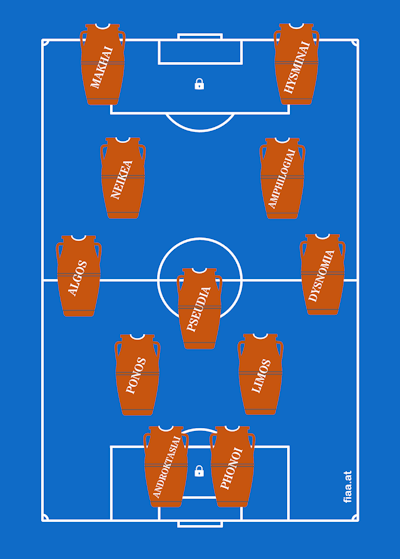
During the early days of humanity, football matches had no need for referees; teams played in a spirit of respect and cooperation, where artistry and creativity took priority over the end result.
But, as you will recall, humanity’s knowledge of football had angered the god, Zeus. He sought revenge on humans for their acquisition of the ball from the Olympians via Prometheus’s treachery.
The divine arbitrator and vengeful chief administrator thus tricked the first female manager into introducing the Pithos Pandora team to the world.
The stories handed down to us from that time speak little of the antics of that particular lineup, even though their appearance ended the harmonious nature of the game, as a glimpse at the teamsheet reveals:
- Ponos (Relegation)
- Limos (Loss of sponsorship)
- Algos (Injuries)
- Dysnomia (Tactical indiscipline)
- Pseudea (Diving)
- Neikea (Dissent)
- Amphilogiai (Misconduct)
- Makhai (Transfer disputes)
- Hysminai (Hooliganism)
- Androktasiai (Fouls)
- Phonoi (Violent conduct)
Instead, ancient literature recalls in particular the one player left in the dressing room. Some scholars argue that Zeus created Elpsi (Hope) as his ultimate punishment for humanity: to remain tortured by (false) expectations that few teams can expect to fulfill, dooming fans to eternal disappointment.
Other scholars argue that Elpsi represents the mitigating impact of the Titaness, Metis, on Zeus’s actions. Hope is all that allows us to continue to enjoy football at all. And without Elpsi, there could be no Liverpool – AC Milan 2005 Champions League final.
Perhaps Elpsi is both. Perhaps Zeus plays with us still.